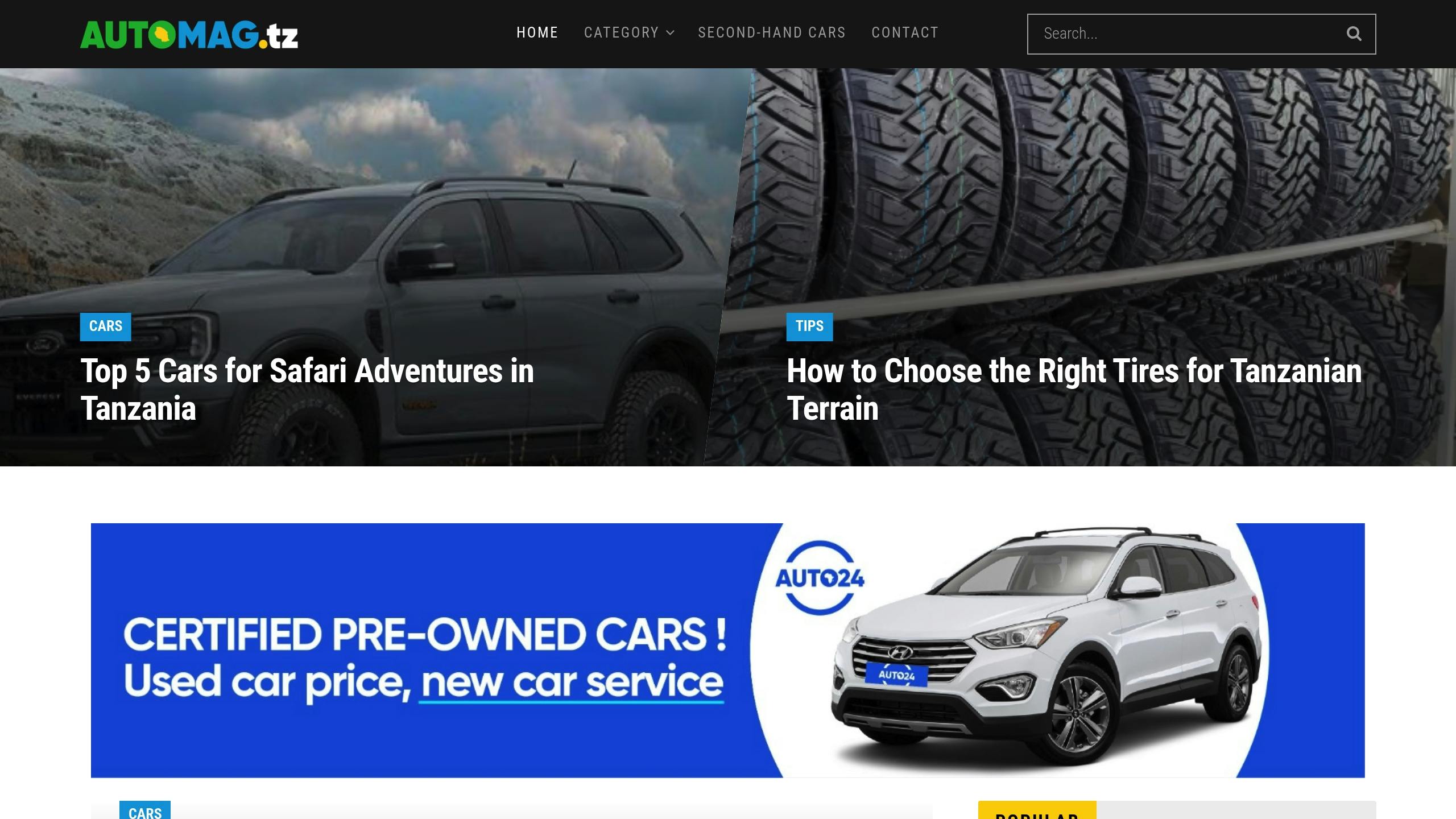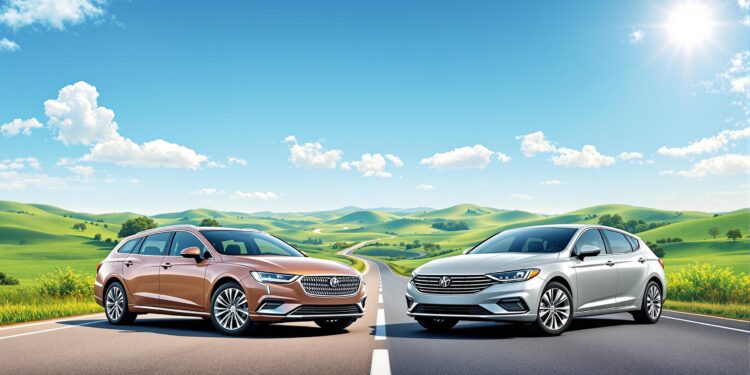Should you buy a new or used car in Tanzania? Here’s the quick answer:
- Used Cars: Cheaper upfront (e.g., Toyota Vitz for TZS 1.9M-3M), but higher maintenance costs and limited warranty options.
- New Cars: Expensive upfront (starting at TZS 25M+), but come with warranties (3-5 years) and lower repair costs.
Key Considerations:
- Road Conditions: Compact cars suit urban areas like Dar es Salaam, while rural areas need sturdy SUVs or pickups.
- Long-Term Costs: Used cars save money initially but may cost more in repairs. New cars depreciate faster but are more reliable.
- Insurance: Annual premiums are tied to car value – new cars cost more to insure.
- Depreciation: New cars lose 40-50% value in 3 years, while used cars drop only 15-25%.
- Market Trends: Japanese imports dominate (87% of used cars), offering better spare parts availability.
Quick Comparison:
| Factor | New Cars | Used Cars |
|---|---|---|
| Price | TZS 25M+ | TZS 1.9M-3M |
| Maintenance Costs | Lower | Higher (frequent repairs) |
| Warranty | 3-5 years | Limited or none |
| Depreciation | 40-50% in 3 years | 15-25% in 3 years |
| Insurance | Higher (7% of value) | Lower |
Bottom Line: Urban buyers may prefer affordable, fuel-efficient used cars like Toyota Vitz. Rural buyers should prioritize durability with options like new Suzuki Jimny or used Land Cruisers.
New VS Used Cars: Don’t Make This Costly Mistake!
1. Price Analysis: New vs. Used Cars
In Tanzania, the price difference between new and used cars plays a major role in shaping buying decisions. Both initial purchase prices and long-term ownership costs weigh heavily on potential buyers. Here’s a closer look at the financial factors involved.
Purchase Price Comparison
The upfront cost of used cars makes them a popular choice, especially for first-time buyers. For example, a new Toyota Vitz starts at TZS 25 million+, while a used 2018-2020 model is available for TZS 1.9-3 million [1][2]. Import duties also influence final prices. Used cars often face higher import duties (25%+) compared to new cars (10%), but their lower base price still translates to big savings [3][5].
| Vehicle Category | Used Price (3-5 years old) | New Price | Potential Savings |
|---|---|---|---|
| Toyota Vitz | TZS 1.9M – 3M | TZS 25M+ | Up to TZS 23.1M |
| Toyota IST | TZS 4M – 7M | TZS 35M+ | Up to TZS 28M |
While the savings on purchase price are clear, long-term costs can offset these advantages.
Service and Repair Costs
Maintenance costs differ greatly between new and used cars. For instance, new Toyota models average TZS 200,000 annually for scheduled services at authorized centers [1]. However, used cars often require more frequent and expensive repairs.
High-mileage vehicles are prone to costly repairs like:
- Engine overhauls: TZS 1-2M
- Transmission repairs: TZS 800K+
- Annual suspension replacements: TZS 300K+
Tanzania’s rough road conditions further drive up these expenses [2][3][5].
Insurance Differences
Insurance costs are another factor that heavily depends on the car’s price. Comprehensive insurance is typically 7% of the vehicle’s value annually [3]. For example, insuring a new Honda Fit costs 7x more than insuring a used 2017 model. On the other hand, third-party liability insurance remains consistent at TZS 50,000-70,000 annually, regardless of the car’s age [3].
These financial considerations play a big role in determining overall vehicle dependability, which we’ll explore next.
2. Vehicle Dependability and Warranty
When buying a car in Tanzania, long-term reliability is a key concern, especially given the country’s mixed terrain and road conditions.
Performance on Tanzanian Roads
Tanzania’s diverse road conditions put vehicles to the test, and reliability often depends on whether you’re driving a new or used car. New cars tend to handle these challenges better, thanks to modern engineering and components. For instance, models like the Toyota IST come with reinforced chassis designed to handle potholes effectively [1][2].
A 2023 study highlighted a stark contrast in maintenance needs: 63% of used sedans required shock absorber replacements within two years, while only 12% of new SUVs faced the same issue [3][6]. This difference significantly affects the overall driving experience, whether in urban areas or on rural roads.
| Vehicle Condition | Common Issues | Maintenance Frequency |
|---|---|---|
| New Cars | Minor suspension tweaks | Annual service |
| Used Imports | Shock absorber replacements | Every 6-8 months |
Mechanics suggest specific maintenance routines to handle Tanzania’s climate and terrain. These include quarterly radiator flushes, monthly undercarriage washes for coastal areas, and synthetic oil changes every 5,000km [1][3]. Such maintenance directly influences ownership costs and ties into the importance of warranties.
Warranty Coverage
Warranty terms are a major consideration for buyers, especially in Tanzania’s challenging driving conditions. New cars often come with 3-5 year comprehensive warranties, such as Toyota’s 5-year/100,000km coverage, which includes critical components like the engine, transmission, and electrical systems [1][4].
Used imports, however, usually offer limited warranty options. Only 18% of dealers provide 6-month powertrain warranties, leaving buyers exposed to higher repair costs [6][4]. For example, unwarranted Nissan March models incur 23% higher maintenance costs over five years compared to new, warranted units [2][6].
Authorized service centers resolve 89% of warranty claims within 72 hours using genuine parts. However, once the warranty expires, their labor costs can be 40-60% higher than those at independent shops [1][4].
"Most manufacturer warranties exclude damage caused by substandard fuel and dust-related engine wear. Only three brands include fuel system cleaning as part of preventative maintenance", reports AutoMag.tz [1][6].
Dust and inconsistent fuel quality are common challenges for vehicles in Tanzania. Upgraded air filters, which cost around TZS 120,000, can help reduce engine wear caused by these factors [3].
sbb-itb-d9186c2
3. Local Market Conditions
Tanzania’s vehicle preferences vary widely across regions, directly influencing decisions between new and used cars. These differences also affect long-term ownership costs, making it essential to consider location when choosing a vehicle.
Car Preferences by Region
First-time buyers should match their vehicle choice to the needs of their specific area to avoid unnecessary maintenance issues. For example, compact cars are popular in urban centers like Dar es Salaam because of their practicality. Coastal regions see 22% greater demand for SUVs due to tourism, while double-cab pickups are favored in lake zones to support fishing activities [1][2].
| Region Type | Preferred Vehicles | Priority Features |
|---|---|---|
| Urban (Dar es Salaam) | Toyota Vitz, Nissan March | Fuel efficiency, easy parking |
| Coastal Areas | SUVs, Tourism vehicles | Tourism-specific needs, resale value |
| Lake Zones | Double-cab pickups | Commercial use, durability |
| Rural Areas | Toyota Land Cruiser, IST | Ground clearance, durability |
Insights on Used Car Imports
Japanese imports dominate Tanzania’s used car market, with popular models like the Nissan March priced between TZS 890,000 and 1.2 million [2]. Their popularity stems from their right-hand drive setup and strong reliability track record.
Key considerations for used imports:
- Undercarriage corrosion affects 23% of vehicles imported from Japan [2].
- Engine tuning may be required to handle 91 RON fuel [4].
- Toyota parts availability is unmatched, covering 98% of repairs [2].
"Most Japanese imports offer great value when properly inspected. Verifying CarVX reports is crucial since 32% show odometer tampering", highlights AutoMag.tz’s latest market analysis [3].
Given these factors, thorough inspections are essential before purchasing a used car.
Service Center Availability
Warranty coverage can help with repair costs, but access to service centers determines how quickly problems are resolved. Dar es Salaam, for instance, has 14 official dealership service centers, while Dodoma has only 2 [3]. This difference significantly impacts maintenance convenience and costs for both new and used car owners.
A comparison of maintenance costs shows clear differences:
| Service Provider | Average Cost | Turnaround Time | Diagnostic Capabilities |
|---|---|---|---|
| Official Dealers | TZS 350,000 | Standard | Full computerized diagnostics |
| Independent Workshops | TZS 220,000 | 15% faster | 72% offer basic diagnostic tools |
4. Value Loss Over Time
The initial cost of a vehicle depends on local market conditions, but its long-term worth is shaped by depreciation trends. For instance, new cars typically lose 40-50% of their value within three years, while used vehicles see a smaller drop of 15-25% over the same period [1][5].
3-Year Value Changes
In Tanzania, commercial vehicles and SUVs tend to hold their value better than sedans. The Toyota Hilux, for example, loses only 25% of its value in three years, compared to 40% for sedans, largely due to strong demand in rural areas [1]. Similarly, models like the Toyota IST retain about 68% of their value, outperforming sedans, which average 52% [1].
| Vehicle Age | 3-Year Depreciation | Example Value Loss |
|---|---|---|
| New | 40-50% | TZS 12M → TZS 7M |
| Used (3-5 years) | 15-25% | TZS 6M → TZS 4.5M |
"Most Japanese imports offer exceptional value retention when properly maintained. Our market analysis shows Toyota models typically retain 5-10% more value after three years compared to other brands in the Tanzanian market", states a survey by Cosmos Tanzania [1][4].
Factors Affecting Depreciation in Tanzania
Several elements contribute to how vehicles lose value:
| Factor | Impact on Value | Mitigation Strategy |
|---|---|---|
| Road Conditions | Accelerated wear and tear | Regular maintenance |
| Coastal Location | Increased risk of electrical damage | Use covered parking |
| Parts Availability | Affects long-term resale value | Opt for widely available brands |
Tips for Better Value Retention
- Choose neutral colors: White and silver vehicles tend to sell for higher prices in Tanzania [3].
- Keep maintenance records: Proper documentation boosts buyer confidence [3].
- Drive carefully: Avoiding harsh usage can extend a car’s lifespan [2].
A study by AutoMag.tz in 2022 highlights the financial benefits of buying used cars. For example, a new Suzuki Alto purchased for TZS 10M depreciated to TZS 5M after three years. In contrast, a two-year-old Alto bought at TZS 6M retained TZS 4.8M in value, saving the buyer TZS 3.2M [2]. These savings underscore the advantages discussed in Section 1. Understanding these patterns is crucial, especially when factoring in safety and inspection requirements, which we’ll examine next.
5. Safety Tips for Buyers
Protecting your investment goes beyond understanding depreciation trends. For Tanzanian buyers, thorough safety checks are a must.
Used Car Checks
When evaluating a used vehicle, consider Tanzania’s climate and road conditions. Key areas to inspect include:
| Component | What to Check For |
|---|---|
| Engine | Smooth operation, no smoke, stable idle in heat |
| Suspension | Quiet performance over potholes, consistent bounce |
| Cooling System | Functional radiator, steady temperature control in high heat |
| Documentation | Valid logbook and maintenance records (important for resale as noted in Section 4) |
Common Mistakes When Buying New Cars
Even with the benefits of warranties (see Section 2), buyers often make costly errors. One frequent mistake is:
| Mistake | Financial Impact | How to Avoid |
|---|---|---|
| Overlooking Insurance | Premiums vary by 4-7% annually | Compare comprehensive insurance options before purchasing |
These steps are especially important in Tanzania, where Japanese imports dominate the market, and warranty terms can be limited.
AutoMag.tz Tools

Digital tools are now indispensable for safe car purchases. AutoMag.tz’s Vehicle History Check has helped many avoid scams. For example, in January 2024, the platform’s VIN decoder flagged a flood-damaged 2018 Toyota Corolla in Dar es Salaam, imported from hurricane-affected areas [3].
| Feature | Benefit |
|---|---|
| VIN Decoder | Verifies factory specs and accident history |
| Price Analysis | Protects against regional overpricing |
| Document Validator | Confirms the authenticity of vehicle paperwork |
"Cross-referencing vehicle documentation through digital platforms has reduced fraudulent sales by 62% since 2022. The combination of physical inspection and digital verification provides the most reliable protection for buyers", according to AutoMag.tz’s 2024 Market Analysis Report [3].
Pair professional inspections – like compression tests and frame alignment checks – with digital tools for the best protection [2][5].
Conclusion
Deciding between a new or used car in Tanzania comes down to your specific needs and priorities. For urban drivers in cities like Dar es Salaam, certified pre-owned Toyota Vitz models (priced between TZS 1.9–3M) strike a great balance between cost and dependability. These cars deliver 18–20 km/l fuel efficiency and come with the advantage of a strong service network [1][2].
In rural areas, the focus shifts due to tougher road conditions. New Suzuki Jimny models provide warranty coverage and are built to handle unpaved roads. On the other hand, well-maintained used Land Cruisers remain a trusted option for navigating rugged terrain [3][4].
| Buyer Profile | Recommended Choice | Key Benefits |
|---|---|---|
| Urban First-Timer | Used Toyota Vitz/Nissan March | Affordable insurance, easy-to-find parts |
| Rural First-Timer | New Suzuki Jimny/Used Land Cruiser | Warranty coverage, off-road capability |
| Budget-Conscious | Used Japanese Imports | Low upfront cost, reliable supply chains |
These suggestions reflect the financial and practical factors discussed earlier, such as maintenance costs and durability. While used cars save you money upfront, they tend to have 15–20% higher annual maintenance costs, according to Cosmos Tanzania’s 2024 data [4][5]. New cars come with the perk of 3–5 year warranties, though buyers should be prepared for faster depreciation in the initial years.
Ultimately, local market trends shape the best options. Japanese imports remain a popular choice, thanks to their dependable spare parts network. Finding the right car means weighing upfront costs against long-term reliability in Tanzania’s unique driving conditions [2][4].
Related Blog Posts
- 7 Best Used Cars Under 10M TSh in Tanzania
- How to Check a Used Car Before Buying in Tanzania
- Toyota vs Suzuki: Which Brand Suits Tanzania Better?
- Car Financing in Tanzania: Pros and Cons




